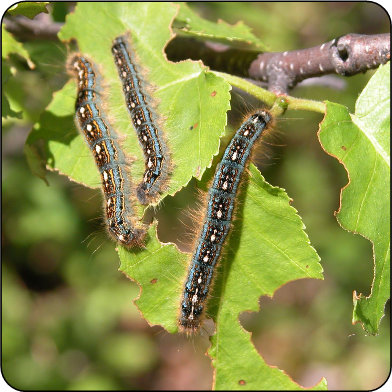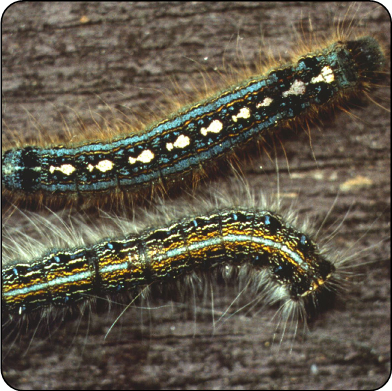Forest tent caterpillar
Information about forest tent caterpillar (Malacosoma disstria), a forest defoliating insect found in Ontario.
Overview
- Native to North America.
- Forest tent caterpillar is the most widespread defoliator of hardwood trees in North America.
- Periodic outbreaks approximately every 10 to 12 years and typically last from 3 to 6 years in a particular area.
Host species
In northern Ontario, forest tent caterpillar prefers trembling aspen (Populus tremuloides) and other poplars, as well as white birch (Betula papyrifera). In southern Ontario, the preferred hosts are sugar maple (Acer saccarum) and oak (Quercus), but it can also be found defoliating many other hardwoods excluding red maple (Acer rubrum).
Characteristics and life cycle
- Adults are buff-brown moths with three darker bands across each forewing.
- They are in flight from late June to early August.
- Eggs are laid in bands of a hundred or more, cemented together in bands completely encircling a twig and covered with a glue-like protective coating.
- Eggs are laid in the summer, with the larvae emerging the following spring at time of bud break.
- Full-grown caterpillars are 50 millimetres long, hairy and brownish, with a slate-blue stripe along each side and a row of keyhole-shaped white spots along the back.
- After feeding for six weeks, the caterpillars spin yellowish cocoons in a sheltered place and then pupate inside.
- Forest tent caterpillars have one generation per year.

Symptoms and damage
- Defoliator feeds on leaves of plants.
- Outbreaks of this insect are periodically very widespread reaching millions of hectares.
- Sustained heavy infestation results in growth reduction and branch killing
- Tree mortality can occur, especially if trees are suffering from other stresses as well (i.e. drought or other insect damage).
- While this insect does not form a tent, it is often confused with the eastern tent caterpillar, which forms a tent in branch crotches and prefers cherry (Prunus) and apple (Malus) trees.

Control measures
Bacillus thuringiensis var. kurstaki(Btk) is a bacterial spray that can be used to protect tree health during outbreaks. Parasites are also important in controlling this pest, such as the large flesh fly (Sarcophaga aldrichi) or the nuclear polyhedrosis virus (NPV).